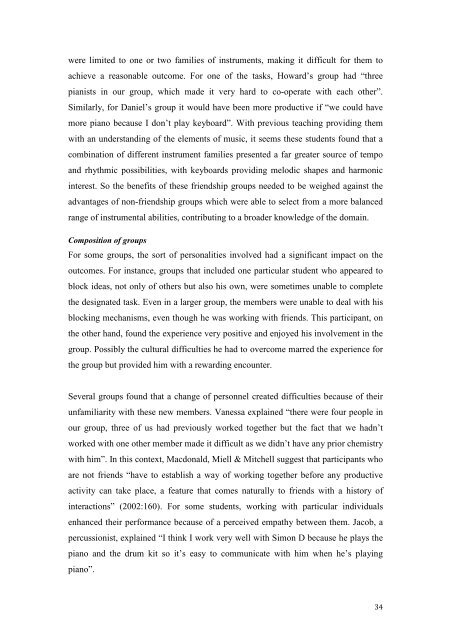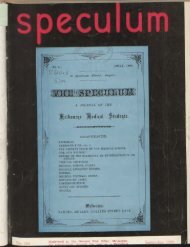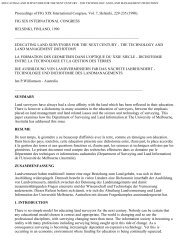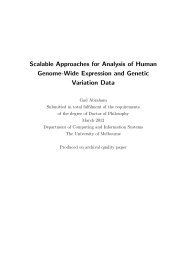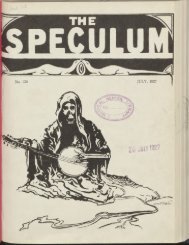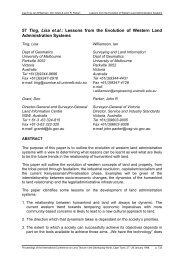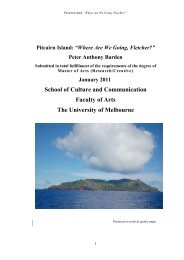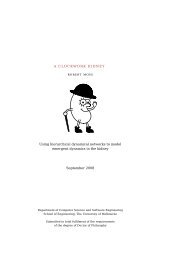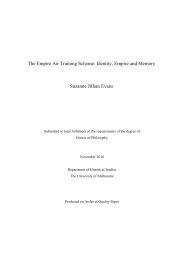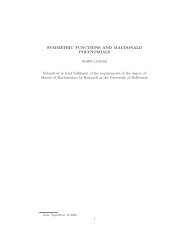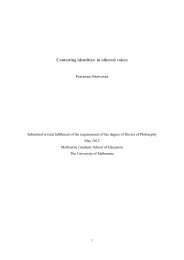approaches to creativity in the music classroom - University of ...
approaches to creativity in the music classroom - University of ...
approaches to creativity in the music classroom - University of ...
Create successful ePaper yourself
Turn your PDF publications into a flip-book with our unique Google optimized e-Paper software.
were limited <strong>to</strong> one or two families <strong>of</strong> <strong>in</strong>struments, mak<strong>in</strong>g it difficult for <strong>the</strong>m <strong>to</strong>achieve a reasonable outcome. For one <strong>of</strong> <strong>the</strong> tasks, Howard’s group had “threepianists <strong>in</strong> our group, which made it very hard <strong>to</strong> co-operate with each o<strong>the</strong>r”.Similarly, for Daniel’s group it would have been more productive if “we could havemore piano because I don’t play keyboard”. With previous teach<strong>in</strong>g provid<strong>in</strong>g <strong>the</strong>mwith an understand<strong>in</strong>g <strong>of</strong> <strong>the</strong> elements <strong>of</strong> <strong>music</strong>, it seems <strong>the</strong>se students found that acomb<strong>in</strong>ation <strong>of</strong> different <strong>in</strong>strument families presented a far greater source <strong>of</strong> tempoand rhythmic possibilities, with keyboards provid<strong>in</strong>g melodic shapes and harmonic<strong>in</strong>terest. So <strong>the</strong> benefits <strong>of</strong> <strong>the</strong>se friendship groups needed <strong>to</strong> be weighed aga<strong>in</strong>st <strong>the</strong>advantages <strong>of</strong> non-friendship groups which were able <strong>to</strong> select from a more balancedrange <strong>of</strong> <strong>in</strong>strumental abilities, contribut<strong>in</strong>g <strong>to</strong> a broader knowledge <strong>of</strong> <strong>the</strong> doma<strong>in</strong>.Composition <strong>of</strong> groupsFor some groups, <strong>the</strong> sort <strong>of</strong> personalities <strong>in</strong>volved had a significant impact on <strong>the</strong>outcomes. For <strong>in</strong>stance, groups that <strong>in</strong>cluded one particular student who appeared <strong>to</strong>block ideas, not only <strong>of</strong> o<strong>the</strong>rs but also his own, were sometimes unable <strong>to</strong> complete<strong>the</strong> designated task. Even <strong>in</strong> a larger group, <strong>the</strong> members were unable <strong>to</strong> deal with hisblock<strong>in</strong>g mechanisms, even though he was work<strong>in</strong>g with friends. This participant, on<strong>the</strong> o<strong>the</strong>r hand, found <strong>the</strong> experience very positive and enjoyed his <strong>in</strong>volvement <strong>in</strong> <strong>the</strong>group. Possibly <strong>the</strong> cultural difficulties he had <strong>to</strong> overcome marred <strong>the</strong> experience for<strong>the</strong> group but provided him with a reward<strong>in</strong>g encounter.Several groups found that a change <strong>of</strong> personnel created difficulties because <strong>of</strong> <strong>the</strong>irunfamiliarity with <strong>the</strong>se new members. Vanessa expla<strong>in</strong>ed “<strong>the</strong>re were four people <strong>in</strong>our group, three <strong>of</strong> us had previously worked <strong>to</strong>ge<strong>the</strong>r but <strong>the</strong> fact that we hadn’tworked with one o<strong>the</strong>r member made it difficult as we didn’t have any prior chemistrywith him”. In this context, Macdonald, Miell & Mitchell suggest that participants whoare not friends “have <strong>to</strong> establish a way <strong>of</strong> work<strong>in</strong>g <strong>to</strong>ge<strong>the</strong>r before any productiveactivity can take place, a feature that comes naturally <strong>to</strong> friends with a his<strong>to</strong>ry <strong>of</strong><strong>in</strong>teractions” (2002:160). For some students, work<strong>in</strong>g with particular <strong>in</strong>dividualsenhanced <strong>the</strong>ir performance because <strong>of</strong> a perceived empathy between <strong>the</strong>m. Jacob, apercussionist, expla<strong>in</strong>ed “I th<strong>in</strong>k I work very well with Simon D because he plays <strong>the</strong>piano and <strong>the</strong> drum kit so it’s easy <strong>to</strong> communicate with him when he’s play<strong>in</strong>gpiano”.34


